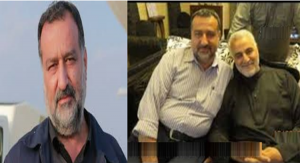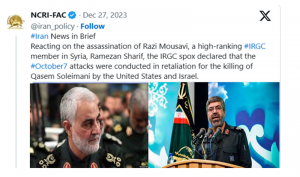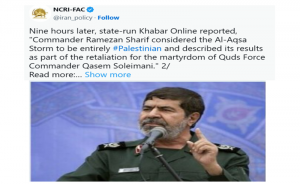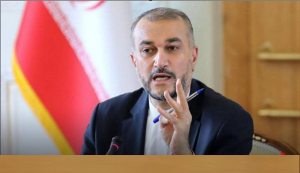
 In recent days, conflicting statements have emerged from various authorities within the (IRGC) regarding Tehran’s...
In recent days, conflicting statements have emerged from various authorities within the (IRGC) regarding Tehran’s... In recent days, conflicting statements have emerged from various authorities within the (IRGC) regarding Tehran’s response to the killing of Razi Mousavi IRGC commander. The Persian-networks reflected widespread joy among Iranians both at home and abroad.

To assert power, General Ramezan Sharif, the official spokesperson for the IRGC, threatening revenge and declaring the Oct. 7 attacks against Israel as a “ response to the killing of Qassem Soleimani, the commander of the IRGC, by the United States and Israel.”

This media controversy, paving the way for potential grave developments. While showing Tehran’s involvement in the deadly conflict in Gaza.Before media headlines could solidify into political stances, Tehran shifted its tone. Sharif, retracted his position .
This latest development has triggered fearful and reactions from the regime. Meanwhile, the regime is trying to save face by maintaining a defiant pose.
— NCRI
PARIS, FARANCE, December 30, 2023 /EINPresswire.com/ — The National Council of Resistance of Iran-(NCRI) Foreign Affairs Committee in an article stated that in recent days, conflicting statements have emerged from various authorities within the Islamic Revolutionary Guard Corps (IRGC) regarding Tehran’s response to the killing of Razi Mousavi.
Initially, as the state media reported the death of the IRGC Logistics commander, Persian-language social networks reflected widespread joy among Iranians both at home and abroad.
Consequently, what began as an exposure of the regime’s military-security vulnerabilities rapidly evolved into a significant socio-political phenomenon, potentially carrying more profound implications for a regime that asserts regional dominance yet struggles to safeguard its top command echelon.
In a last-ditch effort to assert power, General Ramezan Sharif, the official spokesperson for the IRGC, promptly took the stage, threatening revenge and declaring the October 7 attacks against Israel as “a response to the killing of Qassem Soleimani, the commander of the Quds Force, by the United States and Israel.”
The comments quickly ignited a global media controversy, paving the way for potential grave developments. While these implications would have a direct impact on the Iranian regime, individuals in the West who had strategically refrained from acknowledging Tehran’s involvement in the deadly conflict in Gaza due to political considerations would find themselves in a challenging and perplexing situation.
However, before media headlines could solidify into political stances, Tehran shifted its tone. Ramezan Sharif and his superiors retracted from their initial position within less than 12 hours.
Many senior officials, particularly the IRGC Commander-in-Chief Hossein Salami attempted to mitigate the rhetoric, asserting that “seeking revenge for Soleimani would entail the complete destruction of Israel.” The claim was deliberately overstated, aiming to prevent political consequences, while practically providing relief for those inclined to appease.
But as the recent incident completes its 48-hour media lifeline, it unveils deeper layers of significance. Even though this regime has never been shy in calling for the destruction of other nations, certain political perceptions tend to view such statements as mere rhetoric for domestic purposes.
As an example Last week, Iran’s regime carried out an attack against a ship in the Indian Ocean, after which a coalition was formed against its proxy forces in the Red Sea, sending a warning to the regime.
This latest development has triggered fearful and reactions from the regime. Meanwhile, the regime is trying to save face by maintaining a defiant pose.
On December 23, Hossein Amir-Abdollahian, the regime’s foreign minister, said, “We have explicitly told the Americans that these groups and Yemen act based on their own assessments and interests, and we have never ordered them to take action.”
Of course, the regime’s fear and concern about the outcome of its warmongering policies contradict the actions and rhetoric of the commanders of the Islamic Revolutionary Guard Corps (IRGC) and representatives of Iranian regime supreme leader Ali Khamenei in their Friday prayers, who have been making fiery speeches since the early days of the war in Gaza.
They have repeatedly tried to showcase their power and stated that proxy actors in the region, with their weapons, capabilities, and actions, are dependent on the Iranian regime.
On the other hand, the rival faction within the regime, in their analysis and interpretations of the balance of power in the region and the social and political situation in Iran, warn of the “terrifying” consequences of warmongering policies for the integrity of the regime.
Last week, Iran’s regime carried out an attack against a ship in the Indian Ocean, after which a coalition was formed against its proxy forces in the Red Sea, sending a warning to the regime.
This latest development has triggered fearful and reactions from the regime. Meanwhile, the regime is trying to save face by maintaining a defiant pose.
On December 5, the state-run Didar news outlet quoted Ahmad Zeydabadi, the journalist and political analyst, as saying, “They want to implement the ‘Gaza minus Hamas’ slogan at any cost. Well, if Hamas is removed from the equation, then they will turn their attention to Iran. In my opinion, as long as the war continues there, the policy is to prevent a widespread war and Iran’s involvement. The consequences of a widespread war are indeed very severe. But after that, there will be an extraordinary diplomatic and economic pressure on Iran.”
Zeydabadi said the regime has no chance of escaping the crisis of warmongering, a reflection of how part of the regime’s rank and file think. Because after Hamas, it will be the turn of the “head of the snake,” which is the regime.
And if the regime does not become a post-war target, it will be subjected to “extraordinary diplomatic and economic pressures,” according to Zeydabadi. Because the developments in the Middle East cannot be examined in isolation from each other.
That’s why he adds, “The developments in the Middle East are like puzzle pieces that are thrown into the air and suddenly come together in a certain situation. Then we will take a picture, and that picture will be unsettling for Iranian officials.”
He then describes the “unsettling picture” as follows: “The result of this line of action is the ’emergence of a Palestinian state and then intense pressure will be exerted on Hezbollah and Iran, which will be greatly intensified. With the internal situation that we have, this level of dissatisfaction [by the people], this level of feeling under pressure, if added to it, can greatly exacerbate the situation.”
Zeydabadi, while expressing concern about the explosive conditions in society and acknowledging that “we are caught in a bad historical situation,” said, “If the regime shows its inability to address the prevailing societal grievances, we will face conditions much more terrifying than the Mongol invasion of Iran. In such a situation, there will be no security. Unfortunately, everyone understands that such a thing is possible, but no one takes it seriously.”
Certainly, the clerical regime is struggling with multiple challenges internally. Contending with a restless society while grappling with a demoralized follower base as well as a disgruntled elite that has been increasingly marginalized in recent years.
But this internal struggle provides even more motivation for Supreme Leader Ali Khamenei to engage in risky behavior, jeopardizing peace and stability beyond Iran’s borders.
However, the terrorist regime in Iran is also a master of the duplicity game. By employing soft-speaking diplomats, expensive lobbying arms, and self-proclaimed “Iran experts”, it has made sure to interpret its moves and rhetoric for the advocates of the policy of appeasement to avoid global scrutiny and critical decision-making.
Yet beyond all argument and debate, the bloody war in Gaza, funding dozens of militia groups in the Middle East, Africa, and Latin America, and the orchestration of hundreds of terrorist attacks worldwide are tangible and indisputable. These actions represent genuine malicious practices with far-reaching consequences on the global economy and socio-political landscape.
It is an undeniable reality that Khamenei’s regime is the leading state sponsor of terrorism, a nuclear threshold state, and a serious threat to global peace and regional stability.
Equally undeniable is the fact that more than any other nation, Iran has experienced the longest and most persistent series of uprisings, marked by the existence of the oldest and most organized Resistance movement committed to eliminating this terror regime.
Rather than merely listening to and attempting to decipher the words of Iranian state officials, world leaders should scrutinize their actions and recognize the harsh truths that lie behind their rhetoric.
Shahin Gobadi
NCRI
+33 6 61 65 32 31
email us here
This latest development has triggered fearful and reactions from the regime. Meanwhile, the regime is trying to save face by maintaining a defiant pose.
![]()
Article originally published on www.einpresswire.com as (Video) World Should be firm about Contradicting Statements from Iran’s Officials
originally published at HUMAN RIGHTS - USA DAILY NEWS 24



